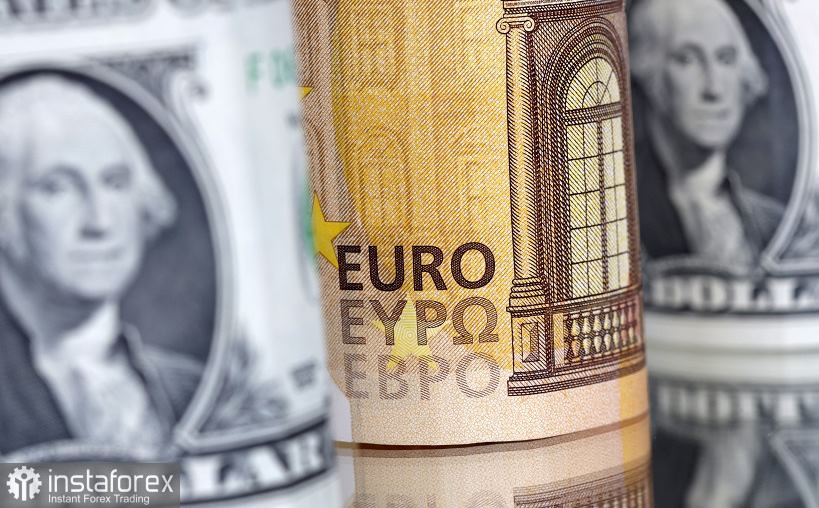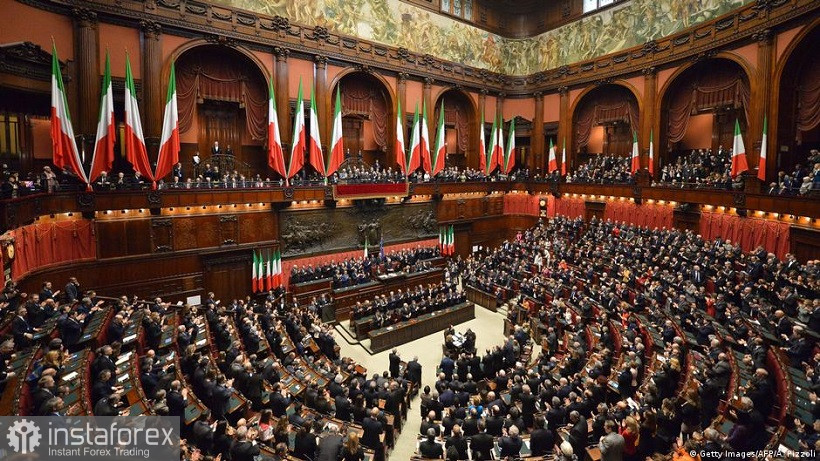The EUR/USD pair has lost its offensive potential. On the eve of the ECB meeting, the euro was in high demand, according to the trading principle "buy on rumors, sell on facts." However, after the announcement of the results of the July meeting, the euro fell under a wave of sales. Insider information about a 50-point rate hike, published on the eve of the meeting, leveled the effect of surprise, so the very fact of the increase did not impress investors.
Market participants focused their attention on further prospects for tightening monetary policy, while in this part, the European Central Bank failed to please buyers of EUR/USD. ECB President Christine Lagarde clearly avoided specifics, stating that further rate hikes would depend on incoming macroeconomic data.

Traders didn't like this "blurring": market participants lost interest in the euro, after which the sellers seized the initiative for the EUR/USD pair. Today the pressure on the pair increased after the publication of European statistics.
So, today PMI indices were published in key European countries, which, as a selection, came out in the "red zone." For example, in France, the index of business activity in the manufacturing sector fell and crossed the key 50-point mark, reaching 49 points. The indicator shows a downward trend for the second month in a row. A similar situation has developed in the services sector, which slowed down to 52.1 points, while it rose to 54 points in June.
The German figures were also disappointing. The manufacturing PMI in the country fell to 49 points, down to a two-year low, the weakest result since July 2020. The indicator has been consistently decreasing for the past five months. Services PMI also slowed down to 49 points (against the expected growth to 52 points). Pan-European PMI indices repeated the trajectory of French and German indicators: manufacturing PMI slowed down to 49 points (after rising to 52 points), services PMI to 50.6 points, that is, almost to the verge of a foul.
The published figures had a significant pressure on the euro because almost all its components crossed the red line of the 50-point mark, reflecting the deterioration of the situation.
In addition, the euro reacted to the latest political events in Italy. Note that almost a year and a half ago—in February 2021—the former head of the ECB, Mario Draghi, after long negotiations, stitched together a broad government coalition by forming and heading the cabinet of ministers. Thus, he then did not allow the dissolution of parliament and the holding of early elections. In other words, Italy managed to avoid the worst-case political scenario at the beginning of last year, thereby supporting the euro.

Today, however, the situation is reversed. Draghi, on his own initiative, resigned from his post (and on the second attempt), provoking the dissolution of parliament and the appointment of early parliamentary elections. Thus, a political crisis erupted in the country during a looming recession and energy crisis. According to economists interviewed by Deutsche Welle, the economic reforms launched by Draghi will slow down again, negatively affecting both the economy and society. Markets are already reacting to his resignation with falling stock prices and pressure on Italian banks.
In other words, the prevailing fundamental background does not contribute to the development of a correction for the EUR/USD pair. The European Central Bank only situationally supported the euro: the buyers of the pair played this trump card yesterday, having lost the initiative after that.
Now the focus is on the July meeting of the Fed, the results of which will be summed up next Wednesday. In anticipation of this event, EUR/USD traders are unlikely to decide on active offensive actions—both downward and upward. Bears will not dare to re-storm the parity level, while bulls will not conquer the area of the third figure, even though these actions are necessary for the development of the downward/upward trend. Traders are stuck within a wide-range flat, the lower border of which corresponds to the Tenkan–sen line on the daily chart (1.0110), and the upper one corresponds to the Kijun-sen line on the same timeframe (1.0290). Most likely, the pair will hold within this price corridor until the announcement of the results of the July meeting of the Fed (July 27).
From a technical point of view, the situation is uncertain. The EUR/USD pair on the daily chart is between the middle and lower lines of the Bollinger Bands indicator, under the Kumo cloud, but between the Tenkan-sen and Kijun-sen lines. In other words, trend indicators do not signal any priority: the pair is at a crossroads. In my opinion, in the medium term, it is advisable to open short positions on the upward pullbacks with the downward target of 1.0110 (the Tenkan-sen line of the Ichimoku indicator on D1).
 English
English 
 Русский
Русский Bahasa Indonesia
Bahasa Indonesia Bahasa Malay
Bahasa Malay ไทย
ไทย Español
Español Deutsch
Deutsch Български
Български Français
Français Tiếng Việt
Tiếng Việt 中文
中文 বাংলা
বাংলা हिन्दी
हिन्दी Čeština
Čeština Українська
Українська Română
Română

